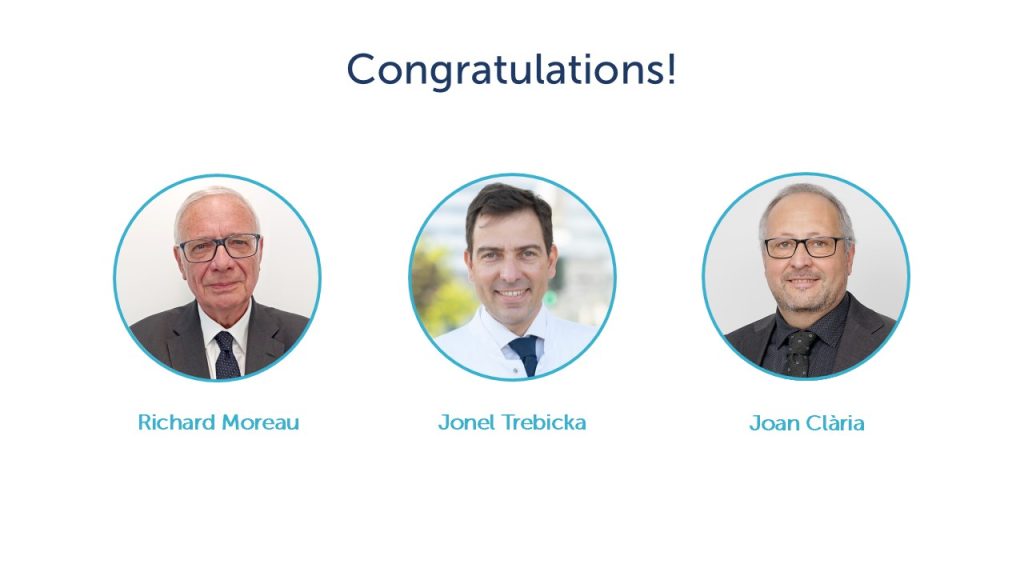Menu

This recognition highlights their long-standing contributions to the field of gastronterology and hepatology, reflecting both the depth and consistency of their scientific work over time. Appearing in both the career-long and recent-year lists, our researchers exemplify how sustained dedication to research continues to resonate across the global scientific community.
Richard Moreau, Director of EF CLIF, has built a career marked by influential discoveries in clinical hepatology. Jonel Trebicka, Deputy Director, is recognized for his innovative research, bridging translational insights and patient care. Joan Clària, Head of Translational Operations, continues to advance the understanding of chronic liver disease through impactful translational studies.
All three are affiliated with leading institutions — including INSERM, University Hospital Münster, and Hospital Clinic de Barcelona — underscoring EF CLIF’s position as a hub of internationally recognized hepatology research. Their presence on the ranking demonstrates not only past achievements but also ongoing relevance, as they continue to guide new investigations and mentor the next generation of scientists.
“Being recognized among the top 2% most cited scientists worldwide is a testament to the sustained impact of our research team, and it reflects the collaborative spirit that drives EF CLIF’s mission”, said Richard Moreau.
This recognition adds to EF CLIF’s legacy of scientific excellence, reaffirming the foundation’s role at the forefront of chronic liver disease research and its continued influence on the field of hepatology globally.
The Stanford University’s list of the World’s Top 2% Scientists provides a publicly available, standardized overview of the world’s most cited researchers across scientific fields. It uses multiple citation metrics — including total citations, h-index, co-authorship-adjusted hm-index, and a composite indicator (c-score) — to capture the scientific impact of individual researchers over their careers and for the most recent year. The database also accounts for authorship position, self-citations, and citations related to retracted papers.
Scientists are classified into 22 scientific fields and 174 subfields, and field-specific percentiles allow comparison among peers. The database identifies researchers whose impact places them in the top 2% of their subfield or among the top 100,000 globally. Career-long data are updated through the end of 2024, while recent-year data reflect citations received in 2024.
This resource highlights influence rather than productivity and provides a snapshot of research impact based on Scopus data as of August 1, 2025.
European Foundation for the Study of
Chronic Liver Failure
Avinguda Diagonal 477, 11th floor
08036 Barcelona, Spain
Tel: +34 93 227 14 00
Email: Send us an email
© 2025 European Foundation for the Study of Chronic Liver Failure

| Cookie | Duration | Description |
|---|---|---|
| cookielawinfo-checkbox-analytics | 11 months | This cookie is set by GDPR Cookie Consent plugin. The cookie is used to store the user consent for the cookies in the category "Analytics". |
| cookielawinfo-checkbox-functional | 11 months | The cookie is set by GDPR cookie consent to record the user consent for the cookies in the category "Functional". |
| cookielawinfo-checkbox-necessary | 11 months | This cookie is set by GDPR Cookie Consent plugin. The cookies is used to store the user consent for the cookies in the category "Necessary". |
| cookielawinfo-checkbox-others | 11 months | This cookie is set by GDPR Cookie Consent plugin. The cookie is used to store the user consent for the cookies in the category "Other. |
| cookielawinfo-checkbox-performance | 11 months | This cookie is set by GDPR Cookie Consent plugin. The cookie is used to store the user consent for the cookies in the category "Performance". |
| viewed_cookie_policy | 11 months | The cookie is set by the GDPR Cookie Consent plugin and is used to store whether or not user has consented to the use of cookies. It does not store any personal data. |